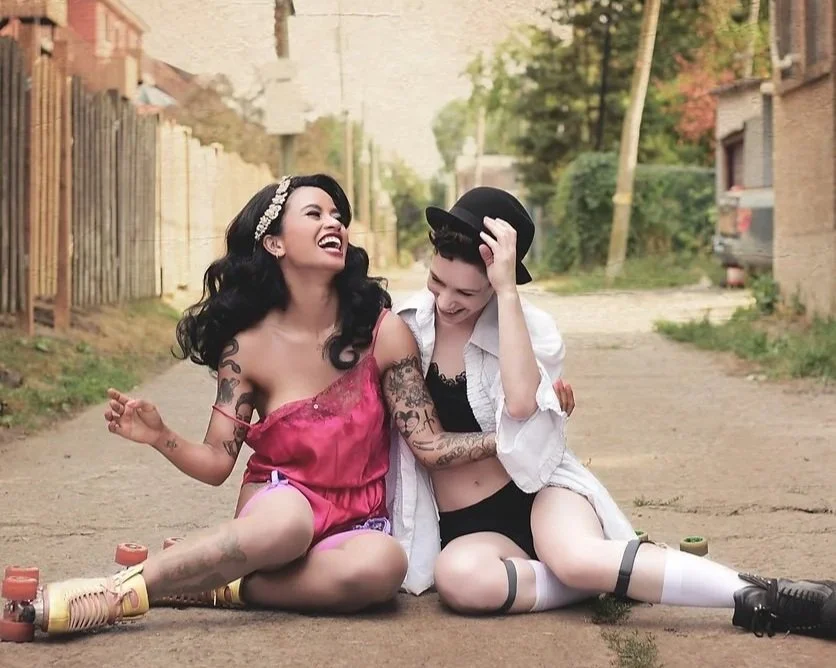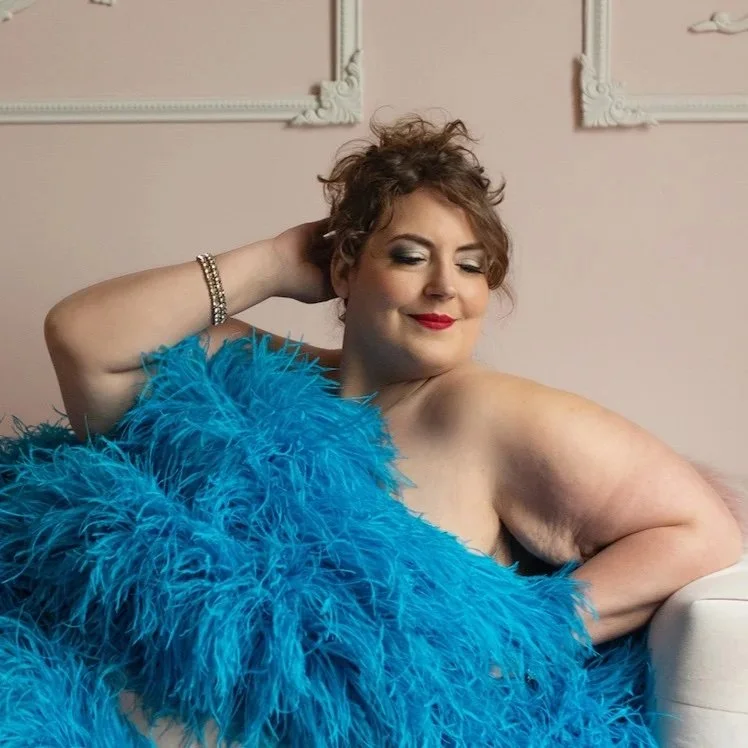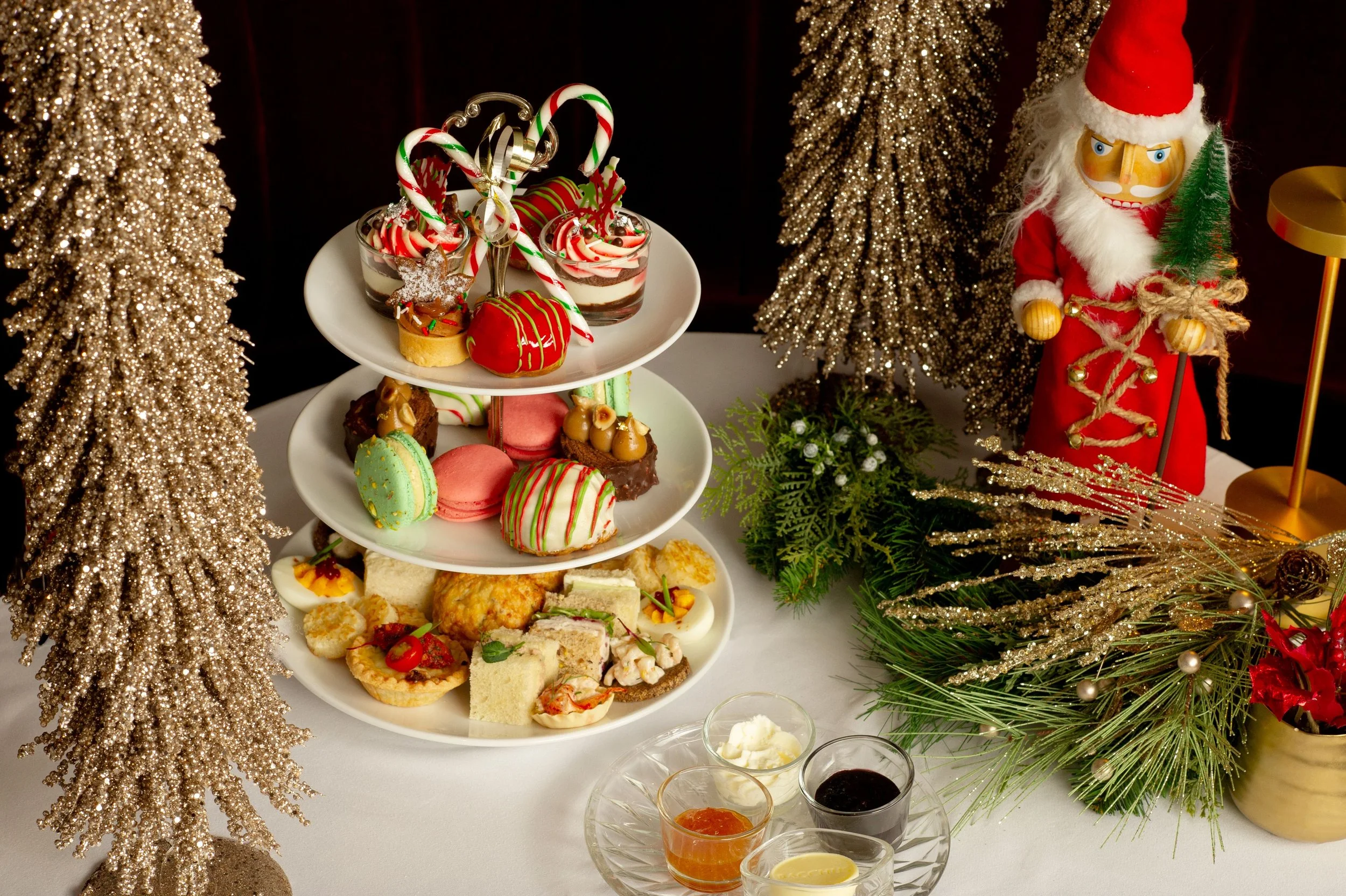Roller skates and queer love stories: Vancouver International Burlesque Festival's new artistic director welcomes full array
Exploring identity and culture in her own acts, Androsia Wilde pushes for radical inclusivity at this year’s event
Androsia Wilde.
Joy Rider and Kozmic Skater.
Vancouver International Burlesque Festival runs from March 29 to April 2, with showcases March 31 and April 1 at the Vancouver Playhouse
FOR AN IDEA of how expansive Vancouver International Burlesque Festival is this year under the curation of new artistic director Androsia Wilde, consider a Montreal act called Kozmic Joy, performing in Saturday night’s The Showpony Soiree showcase. The cheeky strip duet set to Valerie June’s “Mad About the Girl” features Joy Rider in a silver-screen-queen gown and Kozmic Skater in a tux—on roller skates.
“A beautiful, queer love story with a beautiful, 1950s classic burlesque glamour, and you put one of your performers on roller skates? I can safely say for the entirety of the adjudication team that works with me, we were all screaming about that number,” raves Wilde in a phone interview with Stir before the festival kicks off March 29. “It is just absolutely mindblowing—a wonderful combination of complexity, a theme of representation, and also just mad skills.
“Sometimes we like to joke that the Venn diagram between strippers and burlesque performers and roller skaters is actually a circle—but that’s the first time I’ve actually ever seen it implemented!” she adds.
Charlotte Strudel
Beyond Kozmic Joy, the 17th annual festival spans such diverse stars as Vancouver’s Legend Lorna, a Las Vegas Burlesque Hall of Fame inductee who’s pushing 80; and Zyra Lee Vanity, a Toronto star who draws on everything from Afro-Caribbean dance styles to trap music in her work. Add to that performers of size (Wilde is hyped for boa master Charlotte Strudel), performers with disabilities, and a full spectrum of LGBTQ2SIA+ communities. (Another queer-love duet between La Dame Derriere and The Lady Chiffon is another must-see, drawing on Marvel’s Agent Carter, according to Wilde; the local duo shared the Queen of the Roses prize at the 2022 Oregon Burlesque Festival.)
“Age doesn't preclude anybody from being able to do something—and neither do body sizes or anybody's race, gender, or sexual expression,” asserts Wilde.
It’s no surprise that Wilde has made it her goal to amplify diverse and category-busting voices—continuing the hard work, she points out, that previous artistic director Ruthe Ordare had already started. Known around the scene as the “Bahama Mama of Burlesque”, the Nassau-born artist (who grew up mere steps from the glitzy Atlantis Hotel) helped form the all-BIPOC collective Diasporic Dynasty. Onstage, she’s spent years using burlesque to explore complex themes of identity and culture. One of her multilayered acts is “Tribute to the Obeah Man”, referring to the spell-casting and healing traditions of the Caribbean, debuted at VIBF 2019.
The self-described “giant nerd” also has had plenty of inspiration mining pop culture for her numbers—particularly Black characters. “Then it becomes, what does it mean for me to be telling this character’s story in this space?” she explains.
Her burlesque career started in 2014 with a much-lauded debut as Lando Calrissian in Geekenders' initial production of The Empire Strips Back. Later, Wilde realized her dream of creating an entire routine around Star Trek’s Lieutenant Uhuru—a trailblazing character who made an impact on Wilde when she watched reruns growing up.
“As it turns out, I've actually met Nichelle Nichols—she came to Fan Expo a few years ago and I have her autograph,” Wilde says of the actor who played the starship communications officer. “I actually got to tell her—and I'm sure she’s heard it many, many times—how important her role as Uhuru was to generations of Black girls….And I told her, ‘You know, I've always wanted to do a fan dance,’ similar to what she did in Star Trek 5. And she had a good laugh about it.
“So I eventually did that number,” she adds. “I was doing the Star Trek number and fulfilling a promise that I made to this woman. She will never hear it, she will never see it. But I'm paying homage in my own way.”
Along her journey ever deeper into burlesque, Wilde has found a sociopolitical voice that pushes beyond simple bump ‘n’ grind.
“When I first started, I can definitely say burlesque was one of those things that are just like, ‘This is another fun, weird thing that I'm doing that I'm gonna have to figure out how to explain to my parents,’” she says with a hearty laugh. “Then that started turning into, ‘I want more persons like me on the stage.’...All you need is that one person to be on the stage that shares your life story—to share their experience. It can even be just as simple as people needing to see their own body types reflected on stage. I thought that that was what made it more, I guess, serious for me.”
This year, that perspective spreads across not just the two in-person evenings of performance at the Vancouver Playhouse, but a new virtual showcase, workshops, educational “TIT Talks” series, and more. If Wilde seems to have any message, it’s that burlesque is open to anyone with something to express.
“The idea that only certain body types are allowed on stage, or that only certain gender expressions are allowed on stage, or even the idea that skill should be a prerequisite, I think is all bunk,” she says. “A lot of what's considered to be formal training is usually based on a lot of patriarchal, white-supremacist, capitalist-colonialist nonsense, and I don't like that!
“I have to deal with that so much already, in my own life experiences. I don't think burlesque is the place for it,” she says. “So I'm not going to say that I'm necessarily the shining paragon of how all things should be. I'm sure that I have made mistakes in the past and I might slip up even in this role. But I feel like the earnestness of trying is all that you should do. To continue bringing more people up and bringing true inclusivity and radicalization to that space: that's all I want.” That, and of course, more roller skates.
















